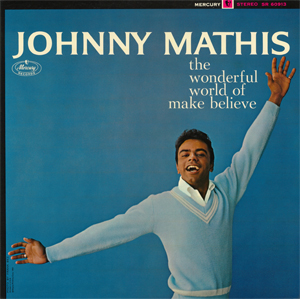Related Research Articles
"Love and Marriage" is a 1955 song with lyrics by Sammy Cahn and music by Jimmy Van Heusen. It is published by Barton Music Corporation (ASCAP).
"Innamorata" is a song written in 1955. The music was written by Harry Warren and the lyrics by Jack Brooks.
"If I Give My Heart to You" is a popular song written by Jimmy Brewster, Jimmie Crane, and Al Jacobs. The most popular versions of the song were recorded by Doris Day and by Denise Lor; both charted in 1954.
"How Important Can It Be?" is a popular song written by Bennie Benjamin and George David Weiss, and published in 1955.
"Domani" is a 1955 song written by Ulpio Minucci with lyrics by Tony Velona. The melody is based on the intermezzo from the comic opera I Quattro Rusteghi by Ermanno Wolf-Ferrari.
"No, Not Much" is a popular song published in 1955. The music was written by Robert Allen Deitcher, the lyrics by Al Stillman. The most popular version was recorded by The Four Lads. It was one of a large number of Stillman-Allen compositions that were recorded by the quartet.

"It's Not for Me to Say" is a 1957 popular song with music by Robert Allen and lyrics by Al Stillman. It was written for the 1957 movie Lizzie, and was sung by Johnny Mathis in the film.
"Suddenly There's a Valley" is a popular song written by Chuck Meyer and Biff Jones and published in 1955.
"And That Reminds Me", also known as "My Heart Reminds Me", is a popular song.
"April Love" is a popular song with music by Sammy Fain and lyrics by Paul Francis Webster. It was written as the theme song for a 1957 film of the same name starring Pat Boone and Shirley Jones and directed by Henry Levin.
Robert Maxwell was an American harpist, songwriter, and teacher who wrote the music for two well-known songs: "Ebb Tide" and "Shangri-La". He also wrote "Solfeggio", used in a repeated skit by entertainment television innovator Ernie Kovacs.

"Rock-a-Bye Your Baby with a Dixie Melody" is a popular song written by Jean Schwartz, with lyrics by Sam M. Lewis and Joe Young. The song was introduced by Al Jolson in the Broadway musical Sinbad and published in 1918.
"I'm in the Mood for Love" is a popular song published in 1935. The music was written by Jimmy McHugh, with the lyrics by Dorothy Fields. The song was introduced by Frances Langford in the movie Every Night at Eight released that year.
"Round and Round" is a popular song by Joe Shapiro and Lou Stallman published in 1956. A version of the song was recorded by Perry Como for RCA Victor on January 15, 1957 and was a big hit that year.
"Jim" is a popular song with music by James Caesar Petrillo and Milton Samuels, lyrics by Nelson Shawn. The song was published in 1941.
"Morgen" is a popular song (1959), originally performed in German by Croatian singer Ivo Robić and The Song-Masters, accompanied by Bert Kaempfert and his orchestra.
"You Can't Sit Down" was originally recorded in 1959 as "Can't Sit Down" by The Bim Bam Boos on Dasher Records catalogue number D-500 and credited to Dasher - Muldrow; it featured Philip Upchurch on guitar and Cornell Muldrow on organ.

The Wonderful World of Make Believe is an album by American pop singer Johnny Mathis that was released by Mercury Records on July 10, 1964, and described by Greg Adams of Allmusic, who wrote, "The theme is fantasy, from imaginary locations to fanciful yearnings to vague, idealized realms ."
"Ruby" is the 1952 theme song for the film Ruby Gentry starring Jennifer Jones, written by Mitchell Parish and Heinz Roemheld. There were six charted versions of the song in 1953.

Music, Martinis, and Memories is a studio album by television personality, Jackie Gleason. It was originally released in 1954 on Capitol Records. The orchestration consists of violins playing the melody while Bobby Hackett plays trumpet.
References
- ↑ "merriam-webster.com". merriam-webster.com. Retrieved June 6, 2020.
- ↑ "secondhandsongs.com". secondhandsongs.com. Retrieved June 7, 2020.
- ↑ Whitburn, Joel (2004). The Billboard Book of Top 40 Hits. New York: Billboard Books. p. 406. ISBN 0-8230-7499-4.
- ↑ Whitburn, Joel (2004). The Billboard Book of Top 40 Hits. New York: Billboard Books. p. 236. ISBN 0-8230-7499-4.
- ↑ "allmusic.com". allmusic.com. Retrieved June 7, 2020.